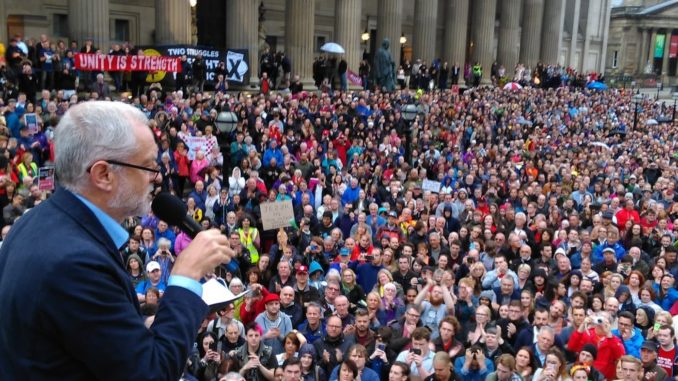
British Prime Minister Theresa May recently called for snap elections to take place on June 8th an in effort to win a more powerful mandate for her Conservative Party ahead of Brexit negotiations.
However, May’s plan backfired as the Conservatives lost their majority of seats in the vote. Now no party holds an outright majority in Parliament.
While the Conservative Party lost seats, the Labour Party led by socialist Jeremy Corbyn won an additional 24 percent of seats and its largest share of votes since 2005.
These gains by the Labour Party underscore the political viability of a socialist platform during a period of right-wing and neoliberal resurgence.
The results of the election were “incredible” for the Labour Party, Corbyn told the BBC after the vote.
“The party that has lost in this election is the Conservative Party,” he said. “The arguments the Conservative Party put forward in this election have lost. I think we need a change.”
He affirmed that Labour did not lose. “We gained seats in every region of the country, we won three million more votes on a much higher turnout. I think that is a pretty good result.”
The election results position Labour as a formidable opposition party and point toward the popularity of their anti-austerity and socialist platform, spearheaded by Corbyn.
“What’s happened is people have said they’ve had quite enough of austerity politics,” Corbyn said in a speech after the vote, “they’ve had quite enough of cuts to public expenditure, under-funding our health service, under-funding our schools and our education service, and not giving our young people the chance they deserve in our society.”
Corbyn was first elected as a Member of Parliament in 1983 in Islington, a leftist area of London. He is a long-time union leader and peace and human rights activist who railed against his party’s support for the Iraq War under Tony Blair.
In the recent election, many voters were drawn to the Labour Party’s socialist platform, outlined in its new manifesto, titled “For the Many, Not the Few.”
The manifesto is a radical document that directly takes on the politics of austerity, privatization, and neoliberalism.
It calls for broad access to education, universal healthcare coverage, nationalization of critical utilities, free college tuition, economic security for workers, massive expansion in public housing, and major taxation efforts to redistribute wealth from corporations and the richest 5% of the population to working people.
The party’s plans would reverse welfare cuts, raise the minimum wage to $15 an hour, prohibit unpaid internships, empower unions’ ability to organize, provide free pre-school childcare and free lunches to all primary school students, and lower the voting age to 16.
“Let’s build a Britain that works for the many, not the few,” Corbyn wrote in the manifesto. “We will measure our economic success not by the number of billionaires, but by the ability of our people to live richer lives.”
The manifesto called for an overhaul of British foreign policy.
“We will put conflict resolution and human rights at the heart of foreign policy,” the document states, “commit to working through the UN, end support for unilateral aggressive wars of intervention and back effective action to alleviate the refugee crisis.”
In the wake of the recent Manchester terrorist attacks, Corbyn boldly made the connections between terrorist violence in Britain and the country’s foreign policy.
“We will also change what we do abroad,” he said, speaking of his party’s new platforms. “Many experts, including professionals in our intelligence and security services have pointed to the connections between wars our government has supported or fought in other countries, such as Libya, and terrorism here at home.”
He promised to ensure “our foreign policy reduces rather than increases the threat to this country.”
The rise of Corbyn and the success of the Labour Party has been watched with excitement by leftists around the world.
In 2015, Senator Bernie Sanders applauded the election of Corbyn as the head of the Labour Party.
“At a time of mass income and wealth inequality throughout the world, I am delighted to see that the British Labour party has elected Jeremy Corbyn as its new leader,” Sanders said. “We need leadership in every country in the world which tells the billionaire class that they cannot have it all.”
Benjamin Dangl has a PhD in history from McGill University and is the editor of TowardFreedom.com, a progressive perspective on world events.
